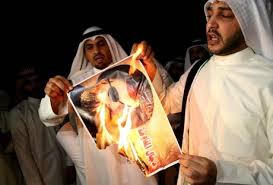 Lebanese Shiites living in the Gulf Cooperation Council (GCC) countries fear they may become the target of backlash over Hezbollah’s military support for the Syrian government in the ongoing conflict.
Lebanese Shiites living in the Gulf Cooperation Council (GCC) countries fear they may become the target of backlash over Hezbollah’s military support for the Syrian government in the ongoing conflict.
The GCC has recently issued a statement warning that it will take measures against those loyal to the Lebanese Shiite movement, Hezbollah.
“The GCC will take measures against [those] in the GCC countries affiliated with Hezbollah in regards to their residencies as well as their financial and business transactions,” said the statement.
According to AFP, at least 18 Lebanese were exiled from Qatar following the warning.
AFP also said that a large number of Shiites, even those who disagree with the Lebanese group, fear that they may be affected by the GCC’s recent decision, despite guarantees that the warning will target Hezbollah supporters only.
“As a Shiite, I came here because of the bad situation in my country. I ran away because Hezbollah is holding a grip on my community,” AFP quoted Ali, a Lebanese Shiite living in Qatar as saying. “Not all Shiites are Hezbollah supporters,” Ali added.
According to the Lebanese newspaper An-Nahar, around 360,000 Lebanese work in the Gulf region, from where they transfer $4 billion in remittances.
Meanwhile, stories of deportation and people being denied GCC residency permits have become rampant in the Lebanese media, with some reports claiming there are “dozen” of citizens being forced to leave the Gulf countries.
Saudi Arabia’s Lebanese community has said that at least 10 people, not all Shiites, were deported, reported AFP.
“The residency permits of dozens of Lebanese were not renewed,” a Lebanese official in Beirut told AFP on condition of anonymity. “We shall not spare any effort to convince the GCC to reverse its decision.”
Saudi Ambassador to Lebanon, Ali Awwad Asiri, said Wednesday that the GCC’s measures will affect the “supporters of Hezbollah… who have been misled,” but “not only Shiites.”
“A person who lives in the kingdom and respects its laws will be respected, but he who violates its regulations will face the GCC penalties,” Asiri told the Lebanon’s Future TV.
The Gulf countries condemned Hezbollah’s involvement in the Syrian crisis, which – according to the United Nations – has led to the death of at least 90,000 people since March 2011.
They said the militia’s interference in the Syrian conflict shows Hezbollah’s “real nature and goals,” adding that its behavior is illegitimate.
Although Lebanon has officially adopted a policy of disassociation in Syria’s conflict, the country is divided along sectarian lines that have been emphasized by the conflict in neighboring Syria.
While Hezbollah and its allies support Syrian President Bashar al-Assad’s regime, the western-backed March 14 opposition movement stands behind the revolt against Assad.
Fighters from Hezbollah – supported by Iran – publicly led a 17-day assault on the Syrian town of Qusayr near the Lebanese border that ended with its recapture from the rebels earlier this month.
The GCC has repeatedly said that it is considering adding Hezbollah, which is back by Iran, to its list of terrorist groups.
Al Arabiya
Photo: Kuwaiti protesters set ablaze a picture of Hezbollah chief Hassan Nasrallah during a protest in front the Lebanese embassy against the group’s involvement in Syria. (File Photo: AFP)

Leave a Reply
You must be logged in to post a comment.